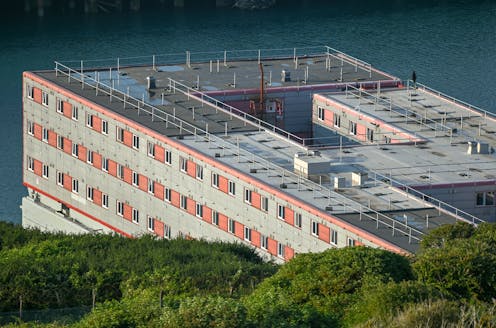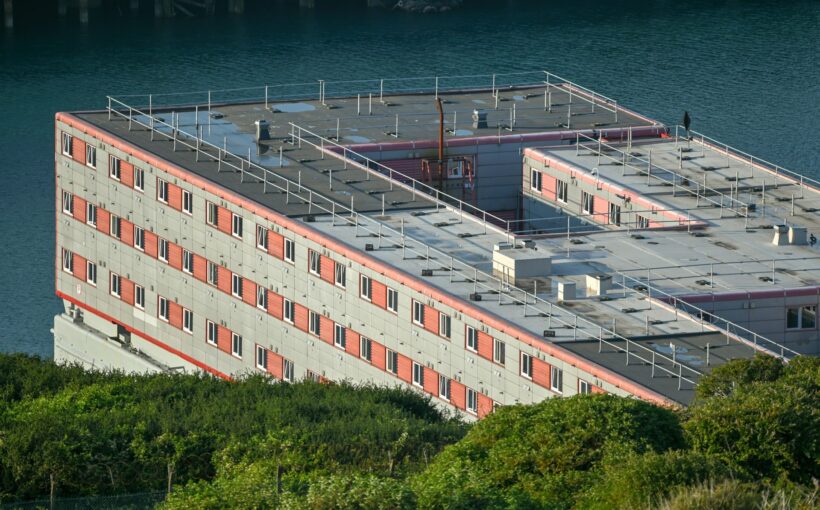
Five months ago, the UK’s Supreme Court ruled that the plan to send asylum seekers to Rwanda was unlawful. The court found the African country was “unsafe” under international law on refugee protection.
The UK government, rather than changing the plan, has just passed a new law to declare that Rwanda is safe. This is not just a farcical legal workaround, it is deeply ironic given the unsafe conditions for asylum seekers in the UK. And, it is dangerous for the wider legal and political system when the government forces through legislation to overturn legal decisions that it does not like, making us all less safe.
The Supreme Court found that sending people to Rwanda risks violating international treaties prohibiting refoulement (returning people to places of persecution). UNHCR, the UN refugee agency, provided the court with evidence of Rwanda’s poor human rights record and defective asylum decision making.
The British embassy in Kigali gave similar feedback in 2020, recommending the UK government should not pursue the Rwanda plan. When, in 2013, Israel entered into a similar deal, thousands of people were then expelled from Rwanda without being allowed to claim asylum.
The UK government knows Rwanda isn’t safe for many people. The Home Office grants refugee status to half of Rwandan asylum applicants each year, with most of those refused then granted protection at appeal.
But focusing solely on the safety of Rwanda misses three key points.
First, that the UK has been forcibly sending asylum seekers to other countries for decades, including to arguably unsafe ones. Second, that asylum seekers – including tens of thousands who cannot be sent to Rwanda due to logistical capacity – are unsafe themselves in the UK. And third, that the new law unilaterally declaring Rwanda “safe” raises dangers for the UK’s own political and legal system.
Asylum seeker removal
European countries have been sending asylum seekers to other member states since 1997. Under the Dublin regulation (which the UK left with Brexit), countries may send people back to the first EU country they arrived in. These countries are not necessarily safe.
Asylum seekers I interviewed for my PhD research described violent police officers and abusive border officers, of being prevented from lodging asylum claims, and being denied accommodation and support in multiple European countries. The European Council on Refugees and Exiles, a network of NGOs working on refugee protection, and the UNHCR have raised similar concerns.
In 2008, several EU countries suspended Dublin transfers to Greece because of its poor treatment of asylum seekers. This included worrying police conduct and detention conditions, and the forcible return of people to inhumane and degrading treatment – raising serious questions about safety.
Safety in the UK
The 1951 UN refugee convention stipulates that people must not be punished for breaking immigration rules in the course of seeking safety. And yet, the UK’s illegal migration act 2023 subjects people who arrive in the UK irregularly to criminal records and lengthy prison sentences, and – shockingly – strips them of their right to have their refugee claims considered.
But people have little choice but to arrive irregularly. The UK has only a handful of legal routes available. It officially resettles barely 700 refugees a year, forcing thousands of people to risk their lives to reach safety.
If people reach the UK, they enter a massive “perma-backlog” of undecided asylum claims and are forced into dangerous accommodation. Each year, the UK incarcerates thousands of asylum seekers in prison-like immigration detention centres. Unlike the rest of Europe, this incarceration has no time limit.
The other asylum accommodation sites are hardly better. The controversial Bibby Stockholm barge in Dorset has been found to be overcrowded and traumatising, had deadly legionella bacteria in the water supply, and was the site of a man’s death last December.
The Manston short-term holding facility in Kent was described as “really dangerous” by the former independent chief inspector of borders and immigration, who found severe overcrowding and outbreaks of rare, contagious diseases. Temporary accommodation site Napier Barracks was found to be so problematic that in 2021 the High Court found the Home Office guilty of employing unlawful practices in holding asylum seekers there.
In just the few months it’s been open, there have been countless acts of self-harm, including suicide attempts, at the Wethersfield airbase in Essex. Last December, the former borders watchdog raised concerns that the Home Office was not keeping Wethersfield “service users safe” and warned of immediate risk of criminality, arson and violence.
Since then, reports have emerged of unexploded ordnance, radiological contamination, inadequate storage of hazardous substances and contamination from poisonous gases.
Asylum accommodation hotels are also attracting far-right demonstrations and anti-immigrant violence. Tragically, but unsurprisingly, rising numbers of asylum seekers are dying in Home Office accommodation.
Even if they are granted permission to stay, asylum seekers are plunged into destitution at unprecedented rates. In England, 12,630 households faced homelessness after eviction from asylum accommodation in the two years to the end of September 2023.
A political distraction
The Rwanda plan is an expensive and unworkable political distraction from the UK’s failings on asylum policy. Even if flights do eventually take off, they will barely touch the massive, government-made backlog of 55,000 people who cannot have their claims processed and risk being left in indefinite limbo in unsafe accommodation.
The UK government’s current approaches to immigration are not reducing numbers. They are simply wasting vast sums of money, making an international mockery of our legal system, and – as tragically occurred on April 23 – costing people their lives.
The UK’s asylum system does not need flights to Rwanda, it needs safe and legal routes so that people do not have to risk their lives to seek protection. And once they arrive, they need better conditions and decision making so that they can get on with their lives in safety.
![]()
Melanie Griffiths does not work for, consult, own shares in or receive funding from any company or organisation that would benefit from this article, and has disclosed no relevant affiliations beyond their academic appointment.



